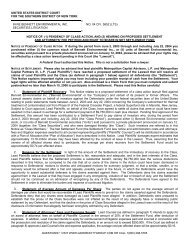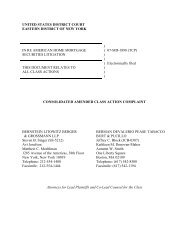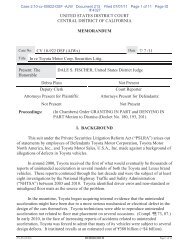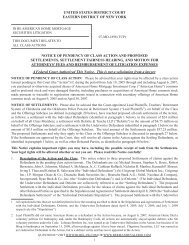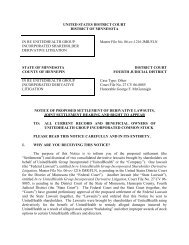to view the Lawdragon's - Bernstein Litowitz Berger & Grossmann LLP
to view the Lawdragon's - Bernstein Litowitz Berger & Grossmann LLP
to view the Lawdragon's - Bernstein Litowitz Berger & Grossmann LLP
Create successful ePaper yourself
Turn your PDF publications into a flip-book with our unique Google optimized e-Paper software.
implementation. An impressive effort composed ofmany organizations is underway throughout <strong>the</strong> entireformer Yugoslavia <strong>to</strong> push for a regional truth commission,known as RECOM. Advocates of <strong>the</strong> process wantRECOM <strong>to</strong> include <strong>the</strong> participation of victims, civilsociety organizations and all of <strong>the</strong> governments ofnations that were party <strong>to</strong> <strong>the</strong> conflicts. Though doubtsremain about <strong>the</strong> chances of securing formal supportfrom <strong>the</strong> governments, Croatian President Ivo Josipovichas been public in his support of <strong>the</strong> initiative andsuggested his counterparts also look in<strong>to</strong> possible meansof implementation.It is often unclear what trials can accomplish on<strong>the</strong>ir own. At times, trial proponents in <strong>the</strong> fieldof transitional justice have scaled back expectationsin recent years, in no small part due <strong>to</strong> <strong>the</strong> mixedperformance of <strong>the</strong> ad hoc tribunals. Theyhave <strong>the</strong> luxury of falling back on a legalisticpremise – that <strong>the</strong> prosecution of many cases should notbe <strong>view</strong>ed as an option but as required by internationallaw, given that <strong>the</strong> Genocide Convention, <strong>the</strong> TortureConvention and “grave breaches” provision of <strong>the</strong>Geneva Conventions require states <strong>to</strong> prosecute orextradite offenders. (A more controversial argument isthat cus<strong>to</strong>mary international law now requires nations<strong>to</strong> prosecute gross human rights violations.) Still,<strong>the</strong>re remains a belief that war crimes cases, when wellconducted, can help promote <strong>the</strong> rule of law, protectand elevate <strong>the</strong> rights of victims, remove dangerouscriminals from <strong>the</strong> streets and establish a credible legalrecord of atrocities. Such a legal record can at leastcontribute <strong>to</strong> an accurate understanding of past crimesthat is shared among different ethnic groups.That last development would surely be transformativein Serbia, as elsewhere in <strong>the</strong> region, but it has yet <strong>to</strong>materialize. Serbs may accept <strong>the</strong> results of individualdomestic cases, but not <strong>the</strong> truth about <strong>the</strong> broaderpatterns of atrocities. In <strong>the</strong> 2011 OSCE public opinionpoll, 69 percent of those inter<strong>view</strong>ed believed thatSerbs suffered <strong>the</strong> most during <strong>the</strong> wars. Therespondents believed that Croats, Albanians andBosniaks (in that order) committed <strong>the</strong> most crimesduring <strong>the</strong> wars, with Serbs committing <strong>the</strong> fewest. Inaddition, 52 percent ei<strong>the</strong>r did not know what happenedin Srebrenica, thought <strong>the</strong> crimes were made up orthat <strong>the</strong>re were casualties in battle but no executions;only 15 percent believed <strong>the</strong> truth of what actuallyhappened, that more than 7,000 Bosniaks wereexecuted. From those measures, nei<strong>the</strong>r <strong>the</strong> ICTY nor<strong>the</strong> domestic War Crimes Chamber appear <strong>to</strong> havecontributed <strong>to</strong> a shared, accurate understanding of <strong>the</strong>events of <strong>the</strong> wars.At least part of <strong>the</strong> explanation for <strong>the</strong> ICTY’s failurein this area is presented in Jelena Subotic’s highlyregarded book, “Hijacked Justice,” which offers a negativeassessment of transitional justice efforts in <strong>the</strong> formerYugoslavia. Her chief contention with Serbia is that <strong>the</strong>use of conditionality – <strong>the</strong> lure of economic aid andEU membership <strong>to</strong> secure cooperation with <strong>the</strong> ICTY,specifically, <strong>the</strong> arrests of suspects – turned war crimesaccountability in<strong>to</strong> a “business transition” that avoided anytrue national reckoning of <strong>the</strong> past. Subotic recounts how<strong>the</strong> post-Milosevic Kostunica government orchestrated aseries of “voluntary surrenders” that had ICTY indicteestransferred amidst praises for <strong>the</strong>ir patriotism andsacrifice – without mentioning <strong>the</strong> nature of <strong>the</strong> allegedcrimes or <strong>the</strong> victims. The prospect of EU membershipclearly contributed <strong>to</strong> <strong>the</strong> May 2008 election of BorisTadic’s Democratic Party, which created a more favorableenvironment for war crimes accountability efforts. Suboticnever<strong>the</strong>less contends that <strong>the</strong> EU and Serbia’s numbersbasedapproach <strong>to</strong> compliance limited <strong>the</strong> positive effectsthat a more genuine transitional justice strategy mighthave had on Serbian society and governmental institutions.The prevailing wisdom also places blame on <strong>the</strong> ICTYitself for failing <strong>to</strong> invest enough resources in<strong>to</strong> outreachactivities <strong>to</strong> explain its mission and <strong>the</strong> composition of <strong>the</strong>cases, in effect allowing its message <strong>to</strong> become “hijacked”by nationalist politicians. In fact, <strong>the</strong> ICTY has arrangeda number of impressive outreach activities throughout<strong>the</strong> region, but <strong>the</strong>se efforts are seen as <strong>to</strong>o little, <strong>to</strong>o late.The domestic system has received praise for its publicinformation efforts and proactive relationship with <strong>the</strong>media. In surveys of journalists in Serbia, Vukcevic and hisdeputy Vekaric have been named <strong>the</strong> “most communicativestate officials.” However, <strong>the</strong>re is limited media or publicinterest in <strong>the</strong> cases. In <strong>the</strong> OSCE polls, very few Serbscould identify any specific cases that have occurred in <strong>the</strong>domestic chamber. (Most observers agree that televisingchamber proceedings would help.)Never<strong>the</strong>less, Vukcevic believes that <strong>the</strong> domestic caseshave been contributing <strong>to</strong> reconciliation.“In my <strong>view</strong>, <strong>the</strong> greatest paradox lies in <strong>the</strong> fact that casesagainst individual perpetra<strong>to</strong>rs do more for <strong>the</strong> processof reconciliation than those against <strong>to</strong>p-level indictees,”he explained. “Namely, it is generally easier for people<strong>to</strong> identify <strong>the</strong>mselves with <strong>the</strong> victim when <strong>the</strong>y hearthat he or she was killed, raped or <strong>to</strong>rtured by a concreteindividual. Cases against <strong>the</strong> highest government officialsare complicated and remote from ordinary people."In addition, <strong>the</strong> legal records of both <strong>the</strong> ICTY andSerbia’s War Crimes Chamber – <strong>the</strong> most tangible outcomesunder <strong>the</strong>ir control – continue <strong>to</strong> grow. How that record isused may be largely out of <strong>the</strong> courts’ control, but itsdevelopment is consistent with any number of worthwhiletransitional justice goals. A more critical interpretation of<strong>the</strong> domestic cases might question whe<strong>the</strong>r <strong>the</strong>ir cumulativeeffect would unduly minimize state complicity. But evenKandic does not qualify her support for <strong>the</strong> existence of <strong>the</strong>system itself.I s s u e 13 51 l a w d r a g o n . c o m




